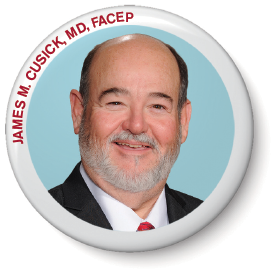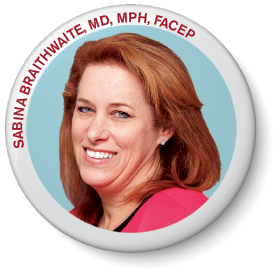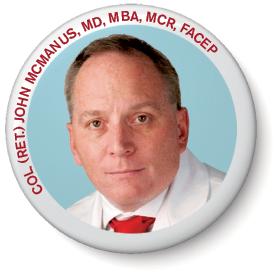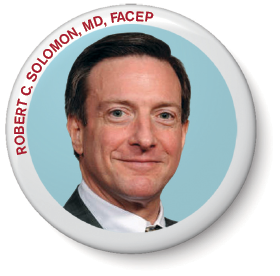
Each October at ACEP’s annual Council meeting, the ACEP Council elects new leaders for the College. The Council, which represents all 53 Chapters, 33 Sections of Membership, the Association of Academic Chairs in Emergency Medicine, the Council of Emergency Medicine Residency Directors, the Emergency Medicine Residents’ Association, and the Society for Academic Emergency Medicine, will elect the College’s President-Elect, four members to the ACEP Board of Directors, the Council Speaker, and the Council Vice Speaker. This month, we’ll meet the candidates for Council officer positions.
Explore This Issue
ACEP Now: Vol 34 – No 10 – October 2015The Council officer candidates responded to the following question:
What one skill do you possess that would be critical to running a successful Council meeting?
Council Speaker
The following is a candidate for ACEP Council Speaker.
James M. Cusick, MD, FACEP (Colorado)
 Current Professional Positions: emergency physician, First Choice ER, Thornton, Colorado
Current Professional Positions: emergency physician, First Choice ER, Thornton, Colorado
Internships and Residency: internal medicine internship, St. Elizabeth’s Hospital Medical Center (NEOUCOM), Youngstown, Ohio; ED elective (two months), Lincoln Hospital and Mental Health Center, South Bronx, New York; emergency medicine residency, Kern County Medical Center, Bakersfield, California
Medical Degree: MD, Fifth Pathway: Nassau County Medical Center/SUNY Stony Brook, New York (1983)
![]() Having been your recent Council Vice Speaker for two years, I sincerely believe there is no “one skill” that is critical to running a successful Council meeting. Instead, it requires a multitude of simultaneous technical skills, a solid Council and College knowledge base, and a keen sense of awareness of one’s immediate surroundings. Maintaining a good sense of humor, being quick of wit, and possessing a cunning ability to hear and feel “the collective will of the Council” strongly support success.
Having been your recent Council Vice Speaker for two years, I sincerely believe there is no “one skill” that is critical to running a successful Council meeting. Instead, it requires a multitude of simultaneous technical skills, a solid Council and College knowledge base, and a keen sense of awareness of one’s immediate surroundings. Maintaining a good sense of humor, being quick of wit, and possessing a cunning ability to hear and feel “the collective will of the Council” strongly support success.
Keeping track of time and being respectful of each other as we deliberate on the floor are extremely important to our success in doing the annual business of the Council. This is our tradition; combined with adherence to bylaws, Council standing rules, and honest heartfelt debate of our resolutions, we reap the rewards of improved patient care, support of our membership, and clarity/direction of purpose. I appreciate our process.
Being a good speaker and running a successful meeting involves being a good communicator. Quality communications begin with being a good listener, being open-minded, and understanding the value of different opinions and sometimes seemingly divergent views in a collegial manner while always considering the unintended consequences of all actions.
I have the ability, “skills,” and personality of an excellent communicator and will bring the level of communication to new heights. I believe I have the “right stuff” and now the appropriate training to be an excellent Council Speaker and will strive to do so with the help of many College leaders, Councillors and Past Speakers as valued resources.
Council Vice Speaker
The following are candidates for ACEP Council Vice Speaker.
Sabina Braithwaite, MD, MPH, FACEP (Kansas)
 Current Professional Positions: associate medical director, Medical Control Board, EMS System for Metropolitan Oklahoma City and Tulsa, Oklahoma (part time); clinical educator, Teleflex; EMS system medical director, Wichita-Sedgwick County EMS System, Kansas; attending emergency physician, Green Country Emergency Physicians, Hillcrest Medical Center, Tulsa, Oklahoma
Current Professional Positions: associate medical director, Medical Control Board, EMS System for Metropolitan Oklahoma City and Tulsa, Oklahoma (part time); clinical educator, Teleflex; EMS system medical director, Wichita-Sedgwick County EMS System, Kansas; attending emergency physician, Green Country Emergency Physicians, Hillcrest Medical Center, Tulsa, Oklahoma
Internships and Residency: medical internship, Medical College of Virginia, Richmond; emergency medicine residency, Medical College of Hampton Roads, Norfolk
Medical Degree: MD, Medical College of Virginia (1991)
![]() I believe the most critical skill to successfully running a Council meeting is the ability to actively listen. Critically listening to the tenor and content of information shared by the Council will facilitate shaping the will of the Council into specific, achievable guidance for the Board. While other skills I possess are also important, I am confident that these must be rooted first in the ability to listen. I feel strongly that the Speaker’s role is not to push forward their own opinion but rather to fully evoke and articulate the voice of the Council—and to keep the meeting productive, on time, and reflective of the diverse and engaging individuals who make up our profession.
I believe the most critical skill to successfully running a Council meeting is the ability to actively listen. Critically listening to the tenor and content of information shared by the Council will facilitate shaping the will of the Council into specific, achievable guidance for the Board. While other skills I possess are also important, I am confident that these must be rooted first in the ability to listen. I feel strongly that the Speaker’s role is not to push forward their own opinion but rather to fully evoke and articulate the voice of the Council—and to keep the meeting productive, on time, and reflective of the diverse and engaging individuals who make up our profession.
Gary R. Katz, MD, MBA, FACEP (Ohio)
 Current Professional Positions: system medical officer, The Schumacher Group; vice president, clinical quality and service excellence, Premier Physician Services; facility medical director, Memorial Health, Marysville, Ohio
Current Professional Positions: system medical officer, The Schumacher Group; vice president, clinical quality and service excellence, Premier Physician Services; facility medical director, Memorial Health, Marysville, Ohio
Internships and Residency: emergency medicine residency, Summa Health System; emergency medicine internship, Summa Health System
Medical Degree: MD, Medical College of Ohio (1998)
![]() Our Council is similar to work in the ED. Many wish to speak, often with competing wants. The effective leader must form order from chaos, help create solutions, and get participants feeling their efforts were time well spent. Helping others to “find their voice” is a skill that I can bring as Vice Speaker.
Our Council is similar to work in the ED. Many wish to speak, often with competing wants. The effective leader must form order from chaos, help create solutions, and get participants feeling their efforts were time well spent. Helping others to “find their voice” is a skill that I can bring as Vice Speaker.
I have experience as Speaker, having served as Chair of the American Medical Association Young Physicians Section. There, physicians from all specialties represented an array of interests, making collaboration essential. Execution of fair and efficient meetings was critical to achieve success. I served two terms as Ohio Chapter ACEP President, where balancing organizational goals with the governance of a varied board was a necessity. Through these experiences, I have proven my skills for the office of Vice Speaker.
Facilitating fair debate is important. For some, public speaking is a barrier, while others struggle in the other direction. The Speaker must work to uplift those who need support and encourage balance from others.
It has been said, “Everything needs to be said, just not by everybody.” The Speaker should help each person find their voice so all comments add value while strengthening reference committees’ focus on consensus building. Through this approach, an efficient and vetted consent calendar would free time to debate more controversial topics, removing the rushed pressure to close debate prematurely.
The diversity of our Council can create rich solutions. The Vice Speaker must assure people find their voice so we may enjoy progress and results. I can do that.
 Col. (ret.) John McManus, MD, MBA, MCR, FACEP (Georgia)
Col. (ret.) John McManus, MD, MBA, MCR, FACEP (Georgia)
Current Professional Positions: EMS fellowship director and professor of emergency medicine, Georgia Regents University, Augusta
Internships and Residency: transitional internship, Eisenhower Army Medical Center, Augusta, Georgia; chief resident, emergency medicine, Fort Lewis, Washington
Medical Degree: MD, Medical College of Georgia (1992)
![]() I’ve spent several years working in both medicine and the military for many great leaders, and much to my surprise, the leaders at most of my jobs did not fit commonly espoused theories of leadership. Although several of my previous leaders and mentors were charismatic, possessed a commanding presence, were visionary and educated at elite schools, all of the most successful were servant leaders. Over the past two decades as I have moved up in the leadership ranks, I have relied on being a servant leader as one of my most prized qualities to build consensus, motivate colleagues and peers, as well as mentor future medical providers off and on the battlefield. A servant leader is one who leads by example and is people-centric. This leader is valued service to others and believes they have a duty of stewardship. I tend to be a humble but passionate operator in my organizations who believes every member should be treated with equal respect and their opinions valued. Servant leaders are felt to be effective because the needs of followers are so looked after that they reach their full potential, hence perform at their best. The strength of this way of looking at leadership is that it forces one away from self-serving, domineering leadership and makes one who is leading think harder about how to respect, value, and motivate people working with them. I look forward to the potential opportunity to serve the Council in this capacity.
I’ve spent several years working in both medicine and the military for many great leaders, and much to my surprise, the leaders at most of my jobs did not fit commonly espoused theories of leadership. Although several of my previous leaders and mentors were charismatic, possessed a commanding presence, were visionary and educated at elite schools, all of the most successful were servant leaders. Over the past two decades as I have moved up in the leadership ranks, I have relied on being a servant leader as one of my most prized qualities to build consensus, motivate colleagues and peers, as well as mentor future medical providers off and on the battlefield. A servant leader is one who leads by example and is people-centric. This leader is valued service to others and believes they have a duty of stewardship. I tend to be a humble but passionate operator in my organizations who believes every member should be treated with equal respect and their opinions valued. Servant leaders are felt to be effective because the needs of followers are so looked after that they reach their full potential, hence perform at their best. The strength of this way of looking at leadership is that it forces one away from self-serving, domineering leadership and makes one who is leading think harder about how to respect, value, and motivate people working with them. I look forward to the potential opportunity to serve the Council in this capacity.
Robert C. Solomon, MD, FACEP
 Current Professional Positions: attending physician, UPMC St. Margaret, Pittsburgh
Current Professional Positions: attending physician, UPMC St. Margaret, Pittsburgh
Internships and Residency: internal medicine residency, The Western Pennsylvania Hospital Emergency Medicine Residency, Pittsburgh
Medical Degree: MD, University of Pittsburgh School of Medicine (1982)
![]() Arguably, the key to running a successful meeting is preparation. Ideally, every Councillor comes to the meeting having carefully read and considered all of the resolutions, including background material, ready to engage in illuminating and pithy debate. Much more important, perhaps, is that the presiding officers have a firm grasp of all business that is to come before the Council. Command of parliamentary procedure is valuable, but more valuable still is the ability to keep debate focused on substance, and that requires a clear sense of what each matter under consideration is really all about and what essential issues must be decided. To borrow an analogy from my many years of experience in writing and editing, it matters little if the grammar and punctuation are all correct (although they must be!) if one reads the article and finds oneself saying, perplexed, “Huh?” My six years on the Bylaws Committee (three as Chair) taught me the importance of attention to detail and the even greater necessity of clarity. Strong preparatory work, with that kind of attention to detail and clarity, will enable me to run Council meetings that are focused and productive.
Arguably, the key to running a successful meeting is preparation. Ideally, every Councillor comes to the meeting having carefully read and considered all of the resolutions, including background material, ready to engage in illuminating and pithy debate. Much more important, perhaps, is that the presiding officers have a firm grasp of all business that is to come before the Council. Command of parliamentary procedure is valuable, but more valuable still is the ability to keep debate focused on substance, and that requires a clear sense of what each matter under consideration is really all about and what essential issues must be decided. To borrow an analogy from my many years of experience in writing and editing, it matters little if the grammar and punctuation are all correct (although they must be!) if one reads the article and finds oneself saying, perplexed, “Huh?” My six years on the Bylaws Committee (three as Chair) taught me the importance of attention to detail and the even greater necessity of clarity. Strong preparatory work, with that kind of attention to detail and clarity, will enable me to run Council meetings that are focused and productive.
Pages: 1 2 3 4 | Multi-Page




No Responses to “2015 ACEP Elections Preview: Meet the Council Officer Candidates”